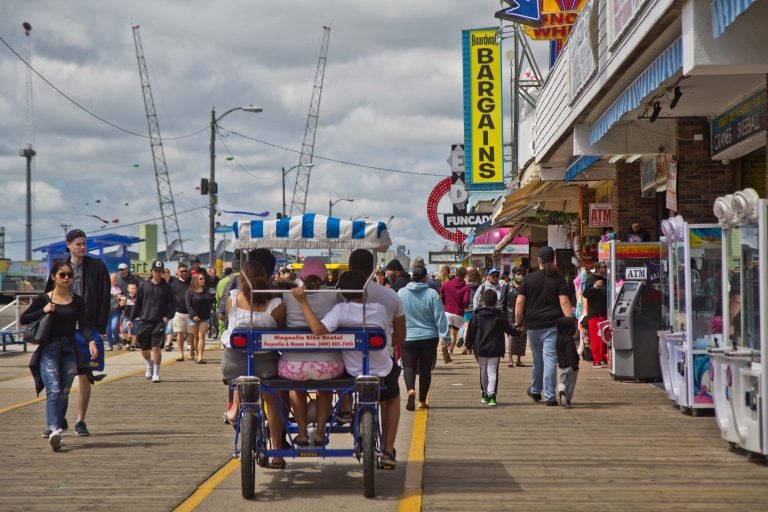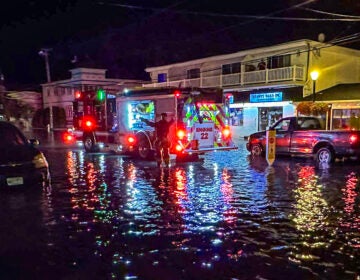A ‘very robust’ 2022 expected as Jersey Shore tourism returns to pre-pandemic levels
Despite inflation and labor challenges, Jersey Shore tourism boosters expect a good year, just not as good as 2021.

Crowds are pictured on the boardwalk in Wildwood on May, 31, 2021. (Kimberly Paynter/WHYY)
From Princeton to Cape May, what do you wonder about South Jersey, its people, and its culture that you want WHYY to investigate? Let us know here.
Representatives of the Jersey Shore’s tourism and hospitality industry expect business will be good this summer. Just not as good as 2021.
They gave their predictions Wednesday during the 14th annual Jersey Shorecast, hosted by Stockton University’s Levenson Institute of Gaming, Hospitality, and Tourism.

Oliver Cooke, associate economic professor at Stockton and editor of the South Jersey Economic Review, says this summer will be “another very robust, very strong” season for the shore. However, he adds a caveat.
“It may not be as robust as last summer because I think there was some very unique characteristics,” he said. “I think that there was so much pent-up savings and pent-up demand.”
The panelists believe that the industry will return to pre-pandemic levels this year.
But inflation is on the minds of the businesses represented on the panel, which they said is challenging.
“Our stuffed animals in our stands have gone up quite a bit because they come on the containers overseas and the shipping has gone up dramatically,” said Sharon Franz, sales and marketing director at Steel Pier in Atlantic City. “It’s just incredible how much shipping is and that gets put on to the product, not just stuffed animals, every product.”
Jim Ziereis, vice president of sales for Caesars Entertainment’s Atlantic City Region, said his company had to have “some creative conversations” with groups after they saw the cost of filet and lobster tail.
“There’s a little sticker shock,” he said, adding that some groups have not visited since before the pandemic began. “So we have to work with them and say, ‘okay, maybe you go with a salmon or a rib eye instead’ and walk them through that to their comfort level.”
Franz added there is no wiggle room in food costs because “right now everything has just really skyrocketed.”
She suggests giving people “a great experience” to combat concerns over rising prices.
“If they’re paying that top dollar, give them a great experience because then they’re going to walk away and they’re going to forget about what it just cost them,” Franz added.
Last year, the industry expected a great season as many COVID restrictions eased in time for Memorial Day Weekend. It turned out to be better than expected.
In Cape May County, tourism director Diane Wieland, said 96% of the business lost due to the pandemic has returned.
“We saw that our lodging has surpassed 2019, which was a record year,” she said. “Visitation has also surpassed 2019 with 10.3 million visitors to Cape May County.”
Wieland adds that the county is starting to see a return of its Canadian visitors, a group that it has marketed to for more than five decades, after not being able to cross the border for two years.
“We normally start marketing in March, we started in December once the border opened,” she said, adding that Canadians are not concerned about gas prices compared to Americans.
“What we’re hearing from them is the gas prices aren’t going to impact them; they’ve been paying a lot for gas anyway,” she said.
The casino resorts are also seeing recovery for the most part, according to Ziereis, with hotel bookings “over the roof” and gambling numbers being compared to 2019. The one area that has not returned to previous levels, he said, is corporate meetings.
“A lot of that has to do with a lot of the corporate headquarters,” Zierieis said. “The workers aren’t even back to work yet.”
The expectation is that those meetings will return once workers are back in the office.
Other than inflation, businesses are still struggling to fill available jobs that would normally go to international students. Last year, the State Department was overwhelmed in processing J-1 Visas, which allowed the students to work in the country during the summer months.
Franz said the system is still “not 100%.” Beyond that, the issue is where they would stay.
“The boarding homes are now being changed into boutique hotels,” she said. “It’s all good things, but in the same token, those are the places where the J-1 would stay.”
She added that an agency that her company works with won’t let them hire students if they do not have housing.
“That’s kind of changed from over the years,” she added. “The kids used to come here and find their housing, but now the agency wants us to actually make sure that in their contract that they have housing or else they will not come here.”
Ziereis with Caesars said there is a part of The Chelsea that is reserved for their J-1 workers.
Overall, the industry is looking for workers from everywhere to help this season, by offering competitive pay and flexible scheduling.
Ziereis likens it to a commercial he saw recently.
“It’s like one guy says, ‘well, I’m really not a morning person, so don’t schedule me before noon’ [and] this person [says,] I can only work this day and this day,’ and they go back and say, ‘you’re hired.’”
WHYY is your source for fact-based, in-depth journalism and information. As a nonprofit organization, we rely on financial support from readers like you. Please give today.







